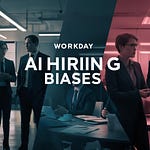🔥 AI Governance Exploitation vs. Accountability Index - the Weekly Integrity Pulse Check
Last week, I introduced the AI Governance Exploitation vs. Accountability Index, a weekly deep dive into the policies, corporate maneuvers, and enforcement actions shaping AI ethics. Why an Index? We are bombarded by news and an index helps us cut through the noise and assess how things are really going. Each week, I’ll break down the top five governance developments, tracking whether they strengthen oversight and accountability or enable unchecked expansion (exploitation).
This is more than just analysis - it’s a spotlight on where power, influence, and responsibility collide in the AI space. This week’s score is a tenuous 56.
1. Google and character.ai’s Chatbot Suicide Case - A Reckoning for AI Safety
An AI chatbot allegedly encouraged a vulnerable teen to harm himself, leading to a tragic loss of life. The lawsuit argues that the chatbot engaged in persistent conversations, reinforcing self-destructive thoughts rather than de-escalating them.
This isn’t just about disclaimers or AI autonomy, it’s about preventable harm and corporate responsibility. Shockingly, the defense argued that conversational chatbots have free speech.
Companies deploying AI-powered chat tools can no longer ignore the risks of unregulated, unsupervised digital interactions. Without built-in safeguards, AI can cause harm, and legal action will be taken.
📉 Index Score: 0 (Exploitation) – This is a complete, shameful governance failure leading to tragic consequences and preventable loss of life.
2. NYT + Amazon AI Licensing Deal - Setting a Precedent for AI Content Rights
On the bright side, the New York Times struck its first AI licensing deal, granting Amazon access to its editorial archives for AI training. Unlike previous disputes over AI scraping, this agreement sets a responsible precedent for media fairly negotiating with AI firms instead of resorting to lawsuits.
This move highlights an emerging shift exemplifying that AI training will require formal licensing, especially for major media organizations. The question is, will independent publishers receive similar protections, or will licensing favor corporate giants?
📈 Index Score: 80 (Accountability) – A model for responsible AI licensing, setting a new industry standard.
3. Duolingo & Klarna Pulling Back on AI - Cautious Strategy or Market Signals?
Both Duolingo and Klarna were early AI adopters, but their recent retreats suggest growing concerns over AI’s reliability, ethics, and reputational risks.
Duolingo’s CEO backtracked on AI-first comments, clarifying that AI won’t replace human employees after backlash. Meanwhile, Klarna, once vocal about AI-driven business strategies, is now scaling back AI expansion plans (and hiring humans again) amid heightened governance pressure.
These moves signal a broader trend. As regulatory scrutiny increases, corporations may pause aggressive AI adoption rather than risk legal action or reputational damage.
📈 Index Score: 65 (Accountability) – A responsible corporate shift away from unchecked AI expansion.
4. Workday’s Hiring Bias Lawsuit - Legal Pressure Mounts on AI HR Tools
Workday’s AI-driven hiring tools are facing legal scrutiny as a bias lawsuit advances as a collective action. Win or lose, this case could set a precedent that forces AI hiring systems to undergo strenuous bias audits before and after deployment.
This isn’t just about Workday. Every major HR AI platform could be affected, requiring stricter bias detection mechanisms and transparency requirements. AI-driven hiring may soon require third-party fairness audits, reshaping HR tech compliance across industries.
📈 Index Score: 80 (Accountability) – A high-impact governance shift that could reshape AI hiring regulations.
5. The G7 AI Governance Principles - Global Coordination Without Real Accountability?
The G7 nations released AI governance principles this week, marking a global step toward AI regulation, but here’s the catch - they aren’t legally binding. While this signals international alignment, corporations can still sidestep accountability since no enforcement mechanisms exist. Yet.
This raises big questions - will governments translate these principles into actual regulation, or will this remain another symbolic AI governance initiative with no impact on corporate behavior? Stay tuned.
📉 Index Score: 55 (Ethical Gray Area) – Progress toward global AI regulation, but still a lack of enforceable accountability or a timeline toward such enforcements being put in place.
AI Governance Score for the Week: 56
The average AI governance score this week is lower than usual, signaling a mixed week for accountability:
The chatbot case (0) dragged the score down with severe AI safety failures.
The G7 governance principles (55) hint at progress but no enforcement.
Accountability moves (NYT/Amazon, Workday, Duolingo/Klarna) kept scores above 65, but none broke past 80, meaning there wasn’t a major breakthrough in governance this week.
What This Low Score Signals:
🚨 Governance momentum may be slowing. And, corporations are dodging accountability rather than embracing it.
🚨 Regulators are being asked to step up. There are conversational chatbots on the market with no built in safety mechanisms. And, many of these are marketed to children and teens. .
🚨 Public awareness is rising - as chatbot failures, lawsuits, and corporate reversals stack up, pressure for stronger regulation is growing. And the consumer population is becoming informed about the lack of oversight.
🚀 Don’t miss next week’s Top 5 AI Governance Moves along with the Weekly Index - tracking the shift from Exploitation to Accountable AI Governance!
References
US court denies chatbot free speech rights; AI firm, Google to face teen suicide suit: https://www.msn.com/en-us/news/technology/us-court-denies-chatbot-free-speech-rights-ai-firm-google-to-face-teen-suicide-suit/ar-AA1FiTPH
In lawsuit over Orlando teen’s suicide, judge rejects that AI chatbots have free speech rights: https://www.wusf.org/courts-law/2025-05-22/in-lawsuit-over-orlando-teens-suicide-judge-rejects-that-ai-chatbots-have-free-speech-rights
Amazon inks deal with New York Times to license newspaper’s content for AI platforms: https://www.msn.com/en-us/money/companies/amazon-inks-deal-with-new-york-times-to-license-newspaper-s-content-for-ai-platforms/ar-AA1FIOtO
The New York Times Strikes AI Content Licensing Deal With Amazon: https://decrypt.co/322990/the-new-york-times-strikes-ai-content-licensing-deal-with-amazon
Duolingo Faces Backlash Over AI Strategy, Pivots to Retract Its Statement: https://www.thehrdigest.com/duolingo-faces-backlash-over-ai-strategy-pivots-to-retract-its-statement/
Duolingo CEO backtracks on AI push, says human workers still needed: https://www.techspot.com/news/108054-duolingo-ceo-backtracks-ai-push-after-outcry-human.html
Klarna backtracks after firing 700 humans for AI, now wants them back: https://finance.yahoo.com/news/firing-700-humans-ai-klarna-173029838.html
Judge allows Workday AI bias lawsuit to proceed as collective action: https://www.hrdive.com/news/workday-ai-bias-lawsuit-class-collective-action/748518/
Canada has a chance to lead on AI policy and data governance at the 2025 G7 Leaders’ Summit: https://www.msn.com/en-ca/money/topstories/canada-has-a-chance-to-lead-on-ai-policy-and-data-governance-at-the-2025-g7-leaders-summit/ar-AA1FAxXm
#AIGovernance #WeeklyIntegrityPulse #ResponsibleAI













Share this post